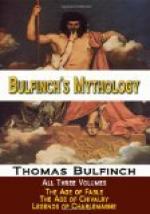Games, national athletic contests in Greece—Olympian,
at Olympia,
Pythian, near Delphi, seat of Apollo’s oracle,
Isthmian, on the
Corinthian Isthmus, Nemean, at Nemea in Argolis
Gan, treacherous Duke of Maganza
GANELON of Mayence, one of Charlemagne’s knights
Ganges, river in India
Gano, a peer of Charlemagne
Ganymede, the most beautiful of all mortals, carried off to Olympus that he might fill the cup of Zeus and live among the immortal gods
Gareth, Arthur’s knight
GAUDISSO, Sultan
Gaul, ancient France
Gautama, Prince, the Buddha
Gawain, Arthur’s knight
Gawl, son of Clud, suitor for Rhiannon
Gemini (See Castor), constellation created by Jupiter from the twin brothers after death, 158
Genghis Khan, Tartar conqueror
Genius, in Roman belief, the protective Spirit of each individual man, See Juno
Geoffrey of MON’MOUTH, translator into Latin of the Welsh History of the Kings of Britain (1150)
Geraint, a knight of King Arthur
Gerda, wife of Frey
Geri, one of Odin’s two wolves
Geryon, a three bodied monster
Gesnes, navigator sent for Isoude the Fair
GIALLAR horn, the trumpet that Heimdal will blow at the judgment day
Giants, beings of monstrous size and of fearful countenances, represented as in constant opposition to the gods, in Wagner’s Nibelungen Ring
GIBICHUNG race, ancestors of Alberich
Gibraltar, great rock and town at southwest corner
of Spain (See
Pillars of Hercules)
Gildas, a scholar of Arthur’s court
Girard, son of Duke Sevinus
Glastonbury, where Arthur died
Glaucus, a fisherman, loving Scylla
GLEIPNIR, magical chain on the wolf Fenris
Glewlwyd, Arthur’s porter
Golden fleece, of ram used for escape of children of Athamas, named Helle and Phryxus (which See), after sacrifice of ram to Jupiter, fleece was guarded by sleepless dragon and gained by Jason and Argonauts (which See, also Helle)
Goneril, daughter of Leir
Gordian knot, tying up in temple the wagon of Gordius, he who could untie it being destined to be lord of Asia, it was cut by Alexander the Great, 48
Gordius, a countryman who, arriving in Phrygia in a wagon, was made king by the people, thus interpreting an oracle, 48
Gorgons, three monstrous females, with huge teeth, brazen claws and snakes for hair, sight of whom turned beholders to stone, Medusa, the most famous, slain by Perseus
Gorlois, Duke of Tintadel




